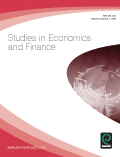
Studies in Economics and Finance
Scope & Guideline
Empowering research that shapes economic policies.
Introduction
Aims and Scopes
- Economic Policy Analysis:
The journal emphasizes research on the implications of economic policies, including fiscal and monetary policies, and their effects on markets and economic performance. - Financial Market Dynamics:
A core area of focus is the behavior of financial markets, including stock, bond, and cryptocurrency markets, with an emphasis on volatility, risk management, and investment strategies. - Sustainable Finance and ESG:
The journal promotes studies on sustainable finance, environmental, social, and governance (ESG) factors, and their impact on investment decisions and corporate performance. - International Economics and Trade:
Research related to international trade dynamics, currency exchange rates, and the effects of global events on local economies is a significant focus. - Behavioral Economics and Finance:
The journal includes studies that explore the psychological factors influencing economic decision-making and market behavior. - Digitalization and Economic Development:
There is a growing emphasis on the interaction between digital technologies and economic development, particularly in relation to financial inclusion and innovation.
Trending and Emerging
- Cryptocurrency and Blockchain Research:
There is a notable increase in studies examining the dynamics of cryptocurrency markets, blockchain technology, and their implications for traditional finance. - Impact of Geopolitical Events:
Research addressing the economic impact of geopolitical tensions, such as the Russia-Ukraine conflict, is trending, highlighting the interconnectedness of global markets. - Sustainable and Green Finance:
A growing body of research is dedicated to sustainable finance, focusing on the role of ESG factors in investment decisions and corporate finance. - Digital Financial Inclusion:
Emerging themes include the impact of digital finance on enhancing financial inclusion, particularly in developing countries, reflecting the ongoing digital transformation. - Behavioral Insights in Financial Decision-Making:
Studies that incorporate behavioral economics to understand investor behavior and market dynamics are increasingly prominent, reflecting a shift towards more holistic analysis. - COVID-19 Impact Studies:
Research analyzing the economic ramifications of the COVID-19 pandemic continues to emerge, focusing on market volatility, recovery strategies, and policy responses.
Declining or Waning
- Traditional Banking Models:
Research focused solely on traditional banking practices has seen a decline, as the sector increasingly adapts to fintech innovations and digital banking solutions. - Static Economic Models:
Static models that do not account for dynamic market conditions or behavioral aspects of investors are becoming less relevant in light of the complex and rapidly changing economic landscape. - Local Market Analysis without Global Context:
Studies that focus exclusively on local market trends without considering global interdependencies are being overshadowed by research that incorporates international perspectives. - Conventional Investment Strategies:
There is a waning interest in purely conventional investment strategies as researchers and practitioners increasingly explore alternative investments and strategies influenced by behavioral finance. - Limited Focus on Non-Financial Metrics:
Research that does not integrate non-financial metrics, such as ESG factors, into financial analysis is becoming less prevalent as stakeholders demand a more comprehensive view of performance.
Similar Journals

JOURNAL OF REAL ESTATE FINANCE AND ECONOMICS
Exploring innovative research in the dynamics of real estate finance.JOURNAL OF REAL ESTATE FINANCE AND ECONOMICS, published by Springer, stands as a vital resource in the field of real estate economics, bringing together innovative research, theoretical frameworks, and empirical studies since its inception in 1988. With an evolving focus that spans various aspects of real estate finance and urban economic dynamics, this journal occupies a prominent position in the academic landscape, reflected in its Q2 ranking in Accounting, Economics and Econometrics, and Finance, alongside a prestigious Q1 status in Urban Studies. Boasting a significant international readership, this journal serves as a key platform for researchers and industry professionals to share groundbreaking findings, thus facilitating knowledge exchange in a rapidly changing economic environment. While the journal currently operates under a subscription model, it remains committed to advancing scholarship with a high impact factor that underscores its relevance and contributions to the ongoing discourse in real estate finance and economics.
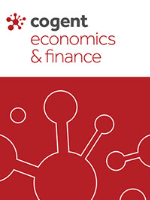
Cogent Economics & Finance
Unlocking interdisciplinary dialogue in economic sciences.Cogent Economics & Finance is a prominent open-access journal published by Taylor & Francis AS, catering to the dynamic fields of economics, econometrics, and finance. With an ISSN of 2332-2039, this journal aims to foster interdisciplinary dialogue and disseminate cutting-edge research from 2013 onwards. Hailing from the United Kingdom and featuring open access since its inception, it provides a platform for researchers, practitioners, and students to access high-quality scholarly articles without barriers. Currently categorized in the Q3 quartile for both Economics & Econometrics and Finance as of 2023, Cogent Economics & Finance remains vital for advancing knowledge in these areas, evidenced by its respectable Scopus rankings—310 out of 716 in Economics and Econometrics and 143 out of 317 in Finance. Its scope encompasses innovative research methodologies and policy implications, making it a significant resource for those on the cutting edge of economic and financial studies. Join us in exploring the critical aspects of this evolving field through our richly detailed articles, which support the academic community in addressing contemporary challenges and opportunities.

Annual Review of Financial Economics
Unveiling Insights in Financial EconomicsAnnual Review of Financial Economics, published by Annual Reviews, stands as a pivotal journal in the fields of Economics and Finance, recognized for its rigorous analysis and comprehensive reviews since its inception in 2010. With an impressive impact factor reflected in its Q1 ranking in both Economics and Econometrics and Finance for 2023, this journal serves as an essential resource for researchers, professionals, and students keen on understanding the dynamic interplay of financial theories and practices. The ISSN 1941-1367 and E-ISSN 1941-1375 signal its commitment to accessibility and dissemination of cutting-edge research within the community. Addressing crucial topics from market behavior to economic modeling, each annual volume synthesizes the latest findings and theoretical advancements, thus contributing significantly to the global discourse within financial economics. With its high Scopus rankings, including a finance rank of #75 out of 317, the journal continues to foster a deep understanding of financial systems and their implications, serving as an invaluable tool for anyone engaged in the broader economic landscape.

Prague Economic Papers
Pioneering Economic Research with a Global PerspectivePrague Economic Papers is an esteemed scholarly journal dedicated to the fields of Economics, Finance, and Econometrics, published by UNIV ECONOMICS-PRAGUE. With its ISSN 1210-0455 and E-ISSN 2336-730X, this journal serves as a vital platform for innovative economic research and theoretical advancement. Operating from the scenic backdrop of the Czech Republic, Prague Economic Papers is recognized in Scopus with rankings that place it in quartile Q4 for Economics and Econometrics, as well as Q3 for Finance, reflecting its growing impact in the academic sphere. Though the journal does not currently offer open access, it ambitiously covers a wide expanse of economic theories and empirical studies, contributing significantly to the evolution of economic thought from 2008 to 2024. Researchers, professionals, and students alike will find this journal essential for accessing critical insights and methodologies that shape contemporary economic discourse.

EKONOMICKY CASOPIS
Empowering Economic Insights for Tomorrow's ChallengesEKONOMICKY CASOPIS is a distinguished journal published by the Institute of Economics Research SAS and the Institute of Forecasting CSPS SAS, offering a comprehensive platform for the dissemination of innovative research in the field of economics and econometrics. Since its inception in 1978, the journal has been committed to fostering scholarly discourse, showcasing empirical studies, theoretical advancements, and policy analyses that contribute to the understanding of economic phenomena. Although categorized in the Q4 quartile in 2023 and ranking in the lower percentiles within Scopus, EKONOMICKY CASOPIS remains a critical resource for researchers and practitioners seeking to engage with the economic challenges of our time. As the journal continues to evolve through 2024, it invites contributions that align with its objectives of enhancing economic insights and promoting academic discussion in Slovakia and beyond. For researchers looking to publish their work or expand their knowledge, EKONOMICKY CASOPIS serves as a vital resource in the expanding landscape of economic research.

Montenegrin Journal of Economics
Exploring Insights for Informed Policy-MakingMontenegrin Journal of Economics, published by ECONOMIC LABORATORY TRANSITION RESEARCH PODGORICA-ELIT, stands as a prominent platform for scholarly discourse in the field of Economics, Econometrics, and Finance. With an ISSN of 1800-5845 and an E-ISSN of 1800-6698, this open access journal has been providing accessible research output since 2005, contributing significantly to the global academic community. The journal’s impact is reflected in its Q2 ranking in the 2023 category of Economics, Econometrics and Finance, holding a commendable position within the 81st percentile according to Scopus rankings. The scope includes a wide array of topics pertinent to economics and finance, encouraging contributions that enhance understanding of both local and global markets. With a focus on quality research, the journal aims to disseminate knowledge that supports informed policy-making and fosters economic development, making it an invaluable resource for researchers, professionals, and students dedicated to the evolving landscape of economic studies.
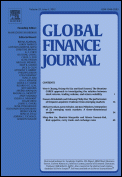
Global Finance Journal
Connecting theory with practice in finance.Global Finance Journal is an esteemed periodical published by Elsevier, dedicated to the dynamic fields of finance and economics. With an impressive history spanning from 1989 to 2024, this journal holds a significant position in the academic community, boasting a Q1 quartile ranking in both Economics and Econometrics, as well as Finance, as of 2023. It is highly regarded in Scopus rankings, placing 40th out of 317 in Finance and 99th out of 716 in Economics and Econometrics, demonstrating its influence and reach among researchers and practitioners alike. Although not an open-access journal, the Global Finance Journal provides rigorous peer-reviewed articles that explore critical issues, advance theoretical frameworks, and address practical applications in global finance. As such, it serves as a vital resource for researchers, financial professionals, and students aiming to deepen their understanding of economic phenomena and contribute to the ongoing discourse in these vibrant disciplines.

Annals of Economics and Finance
Innovating Research for Tomorrow's Economic Challenges.Annals of Economics and Finance is an esteemed academic journal published by Wuhan University Journals Press, focusing on the fields of Economics and Finance. Established in 2000, this journal serves as a platform for scholars to disseminate their research findings and insights, contributing to the development of these disciplines through rigorous peer-reviewed articles. Despite currently holding a Q4 ranking in both Economics and Econometrics and Finance categories (2023), it strives to enhance its impact on the academic community and policy-making audiences. While not Open Access, the journal seeks to cultivate a deeper understanding of vital economic theories and financial practices, thereby offering invaluable resources for researchers, professionals, and students alike. With its broad scope, the Annals of Economics and Finance is poised to play a crucial role in shaping contemporary economic discourse up to 2024 and beyond.
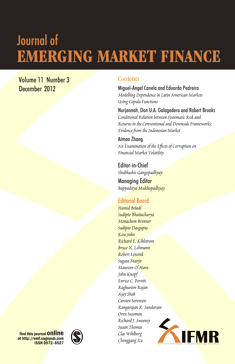
Journal of Emerging Market Finance
Advancing Financial Insights for Developing EconomiesThe Journal of Emerging Market Finance, published by SAGE Publications India Pvt Ltd, is a premier academic journal that serves as a vital resource for researchers, professionals, and students in the fields of finance and economics. Established in 2002, this journal focuses on the multifaceted dynamics of emerging market economies and their financial systems. With an ISSN of 0972-6527 and an E-ISSN of 0973-0710, it has garnered attention with its respectable Q3 rankings in both the Economics and Econometrics and Finance categories, reflecting its commitment to high-quality research. Despite its limited open-access options, the journal remains a significant platform for scholarly discussions, providing insights on emerging financial instruments, market behaviors, and economic policies in developing economies. As a continuously evolving publication, it aims to bridge the gap between theory and practice, promoting an understanding of the complexities faced in these vibrant markets, ultimately serving the academic community with relevant and impactful research until 2024 and beyond.
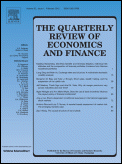
QUARTERLY REVIEW OF ECONOMICS AND FINANCE
Elevating Economic Understanding through Rigorous AnalysisQuarterly Review of Economics and Finance is a renowned academic journal published by Elsevier Science Inc. that focuses on key advancements in the fields of economics, econometrics, and finance. With a commitment to fostering scholarly dialogue, this journal provides a platform for researchers and practitioners alike to disseminate innovative ideas and empirical research, contributing to the economic discourse since its inception in 1992. Recognized for its quality, the journal holds an impressive Q2 ranking in both Economics and Econometrics and Finance, with Scopus rankings placing it in the 81st percentile, underscoring its relevance and impact within the scholarly community. While the journal operates under a subscription model, it boasts a global readership and is accessible to professionals and students seeking insightful and rigorous analyses of contemporary economic issues. With its clear objectives of expanding knowledge and influencing practice, the Quarterly Review of Economics and Finance serves as an essential resource for anyone committed to understanding the dynamics of economics and finance in the modern world.